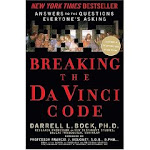In this book, the Emergent church and many of its fallacies are challenged from a biblical perspective and they are found wanting...more on this later.
To begin with, however, I want to say that if I was to give this book a rating, I would give it an 8 out of a 10. I would have given it a 10 but, personally, I did not feel that the two authors were able to effectively mesh together their viewpoints. I would say that this book is more like two books in one! As far as recommendations go, I highly recommend the book, but mainly for the contributions of Kevin DeYoung. His chapters make the book worthwhile. You see, the authors took turns writing the chapters and it is clear in the reading that DeYoung is intent on giving a biblical analysis of the movement, whereas Ted Kluck seems almost confused. Perhaps that is unfair, but I went away from his chapters feeling like Kluck knew the emergent movement was wrong but boy does he think it is attractive and it's leaders brilliant! It reminded me of a married man who knows he should not be speaking flirtatiously with a woman but can't help himself 'cause she's so beautiful and physically enticing! Again, though, DeYound makes the book worth reading and his chapters are engaging, thoughtful, and well presented.
One of the main points which DeYoung addresses is the reluctance of emergent leaders to be straightforward about what they believe...how they question everything and make it seem like this questioning is a virtue...he says "I'ts one thing for a high school student to be in process with his theology. It's another thing for adults to write books and speak around the world about their musings and misgivings." (pg. 17) And this is in the introduction! :)
Later on in the introduction, DeYoung discusses how a number of emergent leaders, including Tony Jones, Doug Pagitt, Spencer Burke, Brian McLaren, and others, wrote an article in which they asserted that each spoke only for himself as an emergent and that they did not even "endorse everything said or written by one another." DeYoung responds as follows: "Fine. But if seven men get together to respond to their critics in one article, they should at least admit they not only share much common ground, but they are also some of the lead influencers (if we can't say spokespersons) in the conversation. Call it a friendship, or a network, or a web of relationships, but when people endorse one another's book and speak at the same conference and write on the same blogs, there is something of a discernible movement afoot." (pg. 18-19)
Some of the issues which DeYoung challenges the leaders in the emergent church movement about are the following:
Is it possible to know God?
Can we take a stand on anything?
Is doctrine important?
Is the Bible authoritative?
From my own ignorant perspective, these are questions I find troublesome in the sense that I cannot believe a professing Christian would ask...but DeYoung does more than be troubled by them. He responds to them. And he does a fine job in doing it. The following are quotes from throughout the book:
"The God of the Bible is nothing if He is not a God who speaks to His people. To be sure, none of us ever infinitely understand God in a nice, neat package of affirmations and denials, but we can know Him truly, both personally and propositionally. God can speak. He can use human language to communicate truth about Himself that is accurate and knowable, without ceasing to be God because we've somehow got Him all figured out." (pg. 37)
"...by saying the Bible is our foundation. We mean the Bible settles our disputes. "The Bible tells us what it true. Our thinking about God, ourselves, and the Word should start with the Bible and never contradict the Bible. In that sensed, what's so wrong with calling the Bible our foundation?" (pg. 81)
"Emergent leaders like to point out Paul's accommodating missional strategy among the Athenians at Mars Hill...[but] [a]fter Paul did his cultural engagement thing, he proclaimed the gospel in no uncertain terms...[t]he apostles never preached with the double-talk and ambiguity you find in so many emergent books." (pg. 109)
"I understand the emergent concern about living rightly in this life. That was a concern of Jesus. But why are heaven and hell as eternal destinations so routinely marginalized in emergent books? If heaven and hell are real and endure forever, as Jesus believed them to be, they ought to shape everything we do during our short time on earth." (pg. 186)
"...Christians on both sides [speaking of Republicans and Democrats] must be careful that the message of Jesus isn't over-identified with politics. Isn't this why the Religious Right is being chastised (sometimes fairly, sometimes unfairly)? American Christianity has at times sounded a lot like the platform of the GOP. Emergent leaders need to be careful they do not make the same mistake in the opposite direction. Emergent Christians shouldn't position themselves as the neutral middle ground when their concerns read like talking points of the Democratic National Committee..." (pg. 189)
One of my favorites quotes from the book:
"The main problem in the universe, according to many emergent writers, seems to be human suffering and brokenness. Make no mistake, suffering and brokenness are a result of the fall, but the main problem that needs to be dealt with is human sin and rebellion. Where pain and brokenness are the main problems, we need to learn to love ourselves. God is no longer a holy God angry with sin, who, in His great mercy, sent His Son to die on our behalf so that divine justice might be satisfied. God becomes a vulnerable lover who opens Himself up to hurt and rejection in order to be with us because we are worth dying for.
I have no doubt that this message will find a receptive audience, but it is not the message the apostles proclaimed and for which they died. Christians don't get killed for telling people that God believes in them and suffers like them and can heal their brokenness. They get killed for calling sinners to repentance and proclaiming faith in the crucified Son of God as the only means by which we who were enemies might be reconciled to God." (pg. 194-195)
This is just a sampling of the richness to be found in DeYoung's chapters. The book helped me better understand (I already had some serious concerns) why the emergent church movement is such a danger...though I say this only in the sense of it misleading the lost into a sense of false security, for despite all things, we know that the Church of our Lord Jesus Christ will endure unto the end. And our Lord will always raise up men like DeYoung to contend rigorously for the faith, as He has in every age.
I once pondered the question of who would succeed the giants who contend for the Truth in our own day and age...I wondered what would happen when we begin to lose men like MacArthur, Piper, Mohler, Zacharias, and others. Well I am now confident that there are young men out there who will step up and fill those places. I look forward to hearing more from Mr. Kevin DeYoung.





No comments:
Post a Comment